Climate change
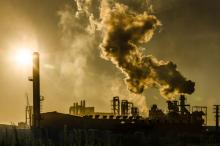
This Wednesday on Capitol Hill, the House subcommittee on Energy and Power held a hearing to discuss the Obama administration’s climate change policies and activities. The policies in question were the president’s Climate Action Plan, announced this summer, which has three main pillars:
- cutting carbon emissions,
- leading international efforts to combat climate change, and
- preparing the United States for climate change impacts.
The Environmental Protection Agency Administrator Gina McCarthy and the Energy Secretary Ernest Moniz were present to answer questions about the president’s plan, which works with new and existing programs in both agencies to reduce our climate change pollution and increase our resilience to climate change. Some of the programs are required by a recent Supreme Court decision that labeled carbon dioxide a pollutant; others, as Moniz pointed out, would happen to carry the benefit of energy efficiency.
For some members of Congress, this is a problem because they do not wish to cede any ground to the executive. For others, it is a problem simply because they do not wish to do anything about climate change.

David vs. Goliath: Residents in a Colorado city are fighting their local coal monopoly for the chance to move their city to clean energy. The coal company has more money – a LOT more money – but the organizers have more heart. This short 6-minute video is well worth watching.
40,000 jobs sound pretty good: According to the new 2013 second quarter clean energy report form Environmental Entrepreneurs (E2), clean energy and sustainable transportation projects launched this year created close to 40,000 green jobs in the U.S.

Editor's Note: The following is an excerpt from Fred Bahnson's new book Soil and Sacrament: A Spirtual Memoir of Food and Faith.
The garden is our oldest metaphor. In Genesis God creates the first Adam from the adamah, and tells him to “till and keep” it, the fertile soil on which all life depends. Human from humus. That’s our first etymological clue as to the inextricable bond we share with the soil. Our ecological problems are a result of having forgotten who we are—soil people, inspired by the breath of God. “Earth’s hallowed mould,” as Milton referred to Adam in Paradise Lost. Or in Saint Augustine’s phrase, terra animata—animated earth.
The command to care for soil is our first divinely appointed vocation, yet in our zeal to produce cheap, abundant food we have shunned it; we have tilled the adamah but we have not kept it.
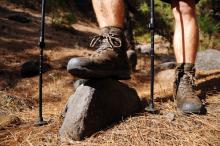
During the week leading up to the “Summer Heat” demonstrations — protesting the Keystone XL pipeline and urging for action on climate change — about 25 people started a hike from Camp David to Washington, D.C. Midway through the 100-mile hike, they were joined by another 50 people at Harper’s Ferry, W.Va. They called their journey the “Walk for Our Grandchildren.”
The name gives away the motivation — the walker’s sense of duty to future generations to leave a healthy planet. When they reached DC, many were arrested in an act of civil disobedience at the offices of Environmental Resources Management, a consulting firm given the task of writing the environmental review of the Keystone XL pipeline — a firm which also works for TransCanada, the energy company seeking to build the pipeline. Many others spent that Friday night at a church, and joined the Summer Heat demonstrations at the White House the next day.
Climate change is expected to take a turn for the better following the Senate's approval of Gina McCarthy to serve as the new head of the Environmental Protection Agency. McCarthy won over the Senate on July 18 in a 59-to-40 vote. The New York Times reports:
The president told Ms. McCarthy that his environmental and presidential legacy would be incomplete without a serious effort to address climate change.
Read more here.
Expressing her opinion that climate change is no longer about energy efficient behavior but rather about national policy, spiritual leader Marilyn Sewell argues the importance of what it takes to preserve the Earth’s atmosphere. Expressing her concerns about the lack of community and church involvement, Sewell insists policy immersion is crucial toward resolving future matters surrounding climate change. The Huffington Post reports:
So where is the parish church in all of this? Mostly silent, it seems. Churches continue to be concerned with individual sin as opposed to systemic sin, even in regard to climate change. Congregants may be admonished to recycle and change their light bulbs, but not to become politically active. The fact is we're way beyond changing our light bulbs. We need to bring that unhappy, startling truth to the pulpits of our land.
Read more here.
In a report obtained by the Los Angeles Times, the Energy Department said Thursday that power plants are at risk of being shut down due to the effects of climate change. With the rise of temperatures and sea levels and decreased water resources, the Energy Department advises officials to become more environmentally aware of their natural disaster plans as their ideas could permanently affect the future of Earth's climate. The Los Angeles Times reports:
The report calls on federal, state and local governments to more urgently prepare crucial infrastructure - particularly coal, natural gas and nuclear plants - for the compounded risks posed by floods, storms, wildfires and droughts.
"All of our science goes in one direction: The damages are going to get worse,” Assistant Energy Secretary Jonathan Pershing said. “It will take dozens of actors from government and private sectors planning what to do and how to make it cost-effective.”
Read more here.

When you think of an evangelical Christian, do you think of a climate scientist who is passionately concerned about the impact of climate change?
After this week, you should.
Over 200 top scientists who identify as evangelical Christians from across the country released a letter this week calling on Congress to act on the moral and scientific imperative to address climate change. The letter — framed in scripture — points to the call to care for the poor and steward God’s creation as key elements contributing to their concern.
As climate change takes its toll on the Earth, many people are paralyzed by inaction—perhaps not out of fear or guilt, but because of despair. To confront climate change, we may need to first deal with our sense of grief, argues Katharine M. Preston in “Mourning for the Earth” (August 2013, Sojourners).
Watch this film essay to learn more about the five stages of climate grief.

In his letter to the Romans, the apostle Paul writes: “I consider that the sufferings of this present time are not worth comparing with the glory about to be revealed to us. For the creation waits with eager longing for the revealing of the children of God …” (Romans 8:18-19)
And who are God’s children in the immediate context? Paul explains the “children of God” are those whose spirits cry “father” when referring to God. “For,” according to Paul, “all who are led by the Spirit of God are children of God.” (Romans 8:14) If this is true, then why is creation longing for the children of God (those led by God’s Spirit) to be revealed?
In Genesis 1, the author writes, “God saw everything that he had made, and indeed, it was very good.” The Hebrew words for “very good” are mehode tobe. Mehode means “forcefully” and in the Hebrew context tobedoes not necessarily refer to the object itself. Rather it refers to the ties between things. So, when God looked around at the end of the sixth day and said, “This is very good,” God was saying the relationships between all parts of creation were “forcefully good.” The relationship between humanity and God, men and women, within families, between us and the systems that govern us, and the relationship between humanity and the rest of creation — the land, the sea, and sky and all the animals and vegetation God created to dwell in those domains—all of these relationships were forcefully good!
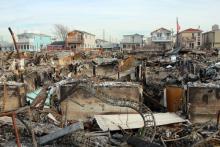
“But you, keep your head in all situations, endure hardship, do the work of an evangelist, discharge all the duties of your ministry.” 2 Timothy 4:5 (NIV)
On Oct. 28, I was shocked into a cruel reality when I received an urgent text message as I was about to preach my Sunday sermon at Mount Carmel Baptist Church in Arverne (Far Rockaway), N.Y. We were told to evacuate immediately, and that both of the bridges that lead to and from the western portion of the peninsula would be shut down. Hurricane Irene had proven to be a false alarm in 2011, and we mistakenly thought that Sandy would be as well. I instructed all of our parishioners to leave immediately after service. My family and I packed up and headed out to my sister’s place in Bloomfield, N.J.
When I ventured back on Halloween, it took more than five hours to get to Far Rockaway, a peninsula that lies between Jamaica Bay and the Atlantic Ocean. What I saw on the way was sobering, if not devastating: boats in the middle of the street, debris everywhere, no electricity for miles and miles of Queens and Long Island, and homes – hundreds, if not thousands flooded — many destroyed. My own home and church in Arverne took on nearly 7 ft. of water. At Mount Carmel, our offices, fellowship hall, kitchen, and bathrooms were destroyed.

As a nutrition student in college, I paid attention to the food we would eat on campus and became keenly aware of how much plastic and material was used and disposed of because of the way our food was packaged. It upset me to see so much packaging thrown in the trash every day. I raised concerns with the Dining Services committee and became a staunch advocate for a better recycling program on campus.
That was my first foray into understanding the relationship between the food system and environmental concerns and their consequent impact on health – something that became a much larger part of my life upon graduation, when I read the book The Omnivore’s Dilemma by Michael Pollan and joined a network of dietitians focused on Hunger & Environmental Nutrition.
The more I read and learned, the more I came to understand the sobering facts about the impacts that our industrial food system has on our society. Power in agriculture has become more and more concentrated over the past several decades, leading to many “monocrops” – large swaths of land devoted to growing only one type of crop rather than a diversity of crops that keeps fields vibrant and healthy. We’ve seen unprecedented extinction of species as a result. Artificial fertilizers lead to soil runoff, nitrous oxide emissions, and pesticides polluting our waterways.
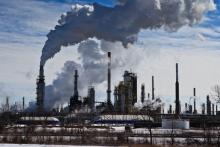
Forget about future generations – climate change is already hitting poor people around the world, not to mention contributing to natural disasters in the U.S. from New York City to Arizona. Apparently that’s not enough for some members of Congress, who have chosen to use their authority to try to block any and all attempts to do something about the problem.
Earlier this month, President Barack Obama announced a major, comprehensive plan of action on climate change – changes that would do much to protect human health, the poor, and future generations by mitigating some of the worst impacts of climate change. A central part of the plan is to address climate pollution at its largest source: coal-fired power plants.
Unfortunately, many members of Congress are already taking steps to decry the president’s plan as a “war” – on coal, on American energy, and yes, even on America itself. Leaders from John Boehner to Michele Bachmann to Joe Manchin have made it pretty clear that they view attempts to care for creation as an assault on our country.
In order to gain substantial backing in the 2014 midterm election, Republicans are beginning to flaunt major environmental and economic issues regarding President Barack Obama’s climate change policies.The New York Times reports:
Elected officials and political analysts said the president’s crackdown on coal, the leading source of industrial greenhouse gases, could have consequences for Senate seats being vacated by retiring Democrats in West Virginia and South Dakota, for shaky Democratic incumbents like Mary L. Landrieu of energy-rich Louisiana, and for the Democratic challenger of Senator Mitch McConnell of Kentucky, the Republican leader.
Read more here.

NOTHING MOVES ME more than a heartfelt tweet. Seriously. Don’t think I’m making fun here. I understand that the Twitter universe (“Twitterverse”? “World o’ Twits”?) is the current preferred method for connecting with the most people in the shortest amount of time. It’s certainly preferable to my generation’s method of communicating, which was to spray-paint the sides of barns.
But if the inspirational tweet is from a member of Congress—taking time away from doing the nation’s business in the most powerful city in the world, depending on where the Koch brothers are living at the time—I can get really choked up.
“My thoughts and prayers are with those in Oklahoma affected by the tragic tornado outbreak.”
Oozing with empathy and originality, this tweet was sent out by Oklahoma Sen. Tom Coburn a few hours after the extreme weather event in May that ravaged the town of Moore. What the tweet did not include—and his office quickly added, lest survivors searching through the rubble for loved ones got the wrong impression—was that the senator would not support federal relief funding unless it was offset elsewhere. If it’s not in the budget, according to Coburn’s long-standing philosophy, it’s not happening.
But let’s be fair: With a tweet you only get 140 characters, so in addition to the words “thoughts” and “prayers,” there’s barely enough room left over to express the important concepts of “freedom,” “liberty,” and “bootstraps,” three concepts people just love to think about when they’re crawling from under what used to be their house. Coburn’s point seems to be that when you’re covered with sheetrock, torn family photographs, and spray-painted sides of barns, the last thing you want is some government bureaucrat arriving with a meddlesome helping hand.
The most precious place on Earth for me is a camp on a lake in the Adirondack Mountains of New York. During the next century, climate change will chase northward things that I cherish. Spruce, tamaracks, sugar maples, balsam fir, moose, mink, and loons will no longer grace the shores and waters of that lake. Like most people in northern climes, I see the changes happening already. I have to fight hard against despair, for my personal losses, yes, but also for the universality and injustice of the calamity, which already affects so many of the poor and innocent.
WHY IS IT so hard for people to respond effectively to the reality of climate change?
Changing people’s minds—with facts, tables, and predictions—has proven extremely difficult. Even showing people the miraculous beauty of the planet alongside the predicted losses is not working. Guilt, anxiety, and anger can be motivating forces, but they have debilitating side effects: They are all soul-destroying.
So I wonder about our hearts. Have we ignored our emotional and spiritual connections to the planet? Could the noise swirling around climate change—science, politics, media blitzes, as well as the weather disasters themselves—drown out the voice of a loss so profound that it rests unnamed in our souls? Could our breaking hearts be part of the reason we are immobilized?
In the 1960s, Rachel Carson’s image of a “silent spring” due to the proliferation of pesticides was as heartrending as it was controversial. Carson was ridiculed, her predictions dismissed. The corporate world paid millions to have her silenced. But eventually the love of bird songs won out. People read Carson’s book, grieved at the prospect of a silent spring, spoke up, and insisted the chemical-company-supported politicians ban DDT.
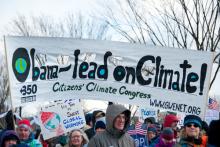
Yesterday was a momentous day for the creation care movement: after years of inaction from Congress, President Obama announced a major, comprehensive plan of action on climate change. President Obama’s new “Climate Action Plan,” which he laid out in a speech at Georgetown University Tuesday, addresses the country’s largest source of climate pollution — carbon dioxide from power plants — as well as boosting energy efficiency standards, renewable energy production on public lands, and resilience for cities, towns and roads.
President Barack Obama revealed his approval of the Keystone XL pipeline project during his climate change speech on Tuesday. With the effort to reduce carbon pollution, Obama has agreed to move forward with the process providing that the Keystone XL pipeline doesn’t release an increasing amount of greenhouse gasses into the environment. The Hill reports:
“Our national interest will be served only if this project doesn't significantly exacerbate the problem of carbon pollution,” Obama said in speech laying out his second-term climate agenda, including greenhouse gas emissions for power plants.
“The net effects of the pipeline's impact on our climate will be absolutely critical to determining whether this project can go forward.”
Read more here.
With hopes to reduce mass amounts of pollution, President Obama has begun forming a list of ideas to condense the amount of carbon dioxide entering earth’s atmosphere. He plans to act quickly as such a process could take years to accomplish. The New York Times reports:
The administration has already begun steps to restrict climate-altering emissions from any newly built power plants, but imposing carbon standards on the existing utility fleet would be vastly more costly and contentious.
Read more here.
Thomas Tidwell, the chief of the United States Forest Service, told Congress hotter, dried conditions produced by climate change are causing America's longer wildfire season and increasing the amount of land burned. Since 2000, the forest service has almost doubled its spending on fighting fires from $540 million to $1 billion last year. The Guardian reports:
"Hotter, drier, a longer fire season, and lot more homes that we have to deal with," Tidwell told the Guardian following his appearance. "We are going to continue to have large wildfires."
Read more here.